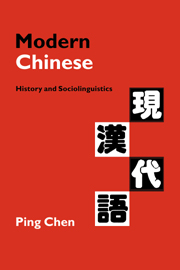Book contents
- Frontmatter
- Contents
- List of tables
- Preface
- Acknowledgements
- List of abbreviations
- 1 Introduction
- Part I Modern Spoken Chinese
- Part II Modern Written Chinese
- Part III The modern Chinese writing system
- 8 Basic features of the Chinese writing system
- 9 Simplification of the traditional writing system
- 10 Phonetization of Chinese
- 11 Use and reform of the Chinese writing system: present and future
- 12 Conclusion
- Notes
- References
- Index
12 - Conclusion
Published online by Cambridge University Press: 05 June 2012
- Frontmatter
- Contents
- List of tables
- Preface
- Acknowledgements
- List of abbreviations
- 1 Introduction
- Part I Modern Spoken Chinese
- Part II Modern Written Chinese
- Part III The modern Chinese writing system
- 8 Basic features of the Chinese writing system
- 9 Simplification of the traditional writing system
- 10 Phonetization of Chinese
- 11 Use and reform of the Chinese writing system: present and future
- 12 Conclusion
- Notes
- References
- Index
Summary
I have described and analysed the development of Modern Chinese since the late nineteenth century from historical and sociolinguistic perspectives, concentrating on three major aspects, namely, Modern Spoken Chinese, Modern Written Chinese, and the Modern Chinese writing system.
As the fundamental institution of society, language both influences and reflects the development of the community in which it is used. The development of Modern Chinese since the late nineteenth century constitutes an integral part of the history of Chinese society and Chinese people over the period, and is best understood in that context. All the major changes to the language during the period followed events of historical significance, which include military defeats of China by Western powers in the nineteenth century, the overthrow of the imperial Qing dynasty and the founding the Republic of China in the early 1910s, the New Culture Movement in the late 1910s, and the founding of the People's Republic of China in 1949. Linguistic standards, particularly in relation to the written style, and the writing system, had been firmly in place in the country before modern times. They were for the most part enforced by official institutions, and held in reverence by the general public. The historical events in modern times prompted reform-minded scholars, educators, and politicians to take a critical examination of the Chinese language in close connection with the social, political, economic, educational, and cultural aspects of the country, and at the same time created a society that was more receptive to changes and innovations initiated into the language.
- Type
- Chapter
- Information
- Modern ChineseHistory and Sociolinguistics, pp. 202 - 203Publisher: Cambridge University PressPrint publication year: 1999



